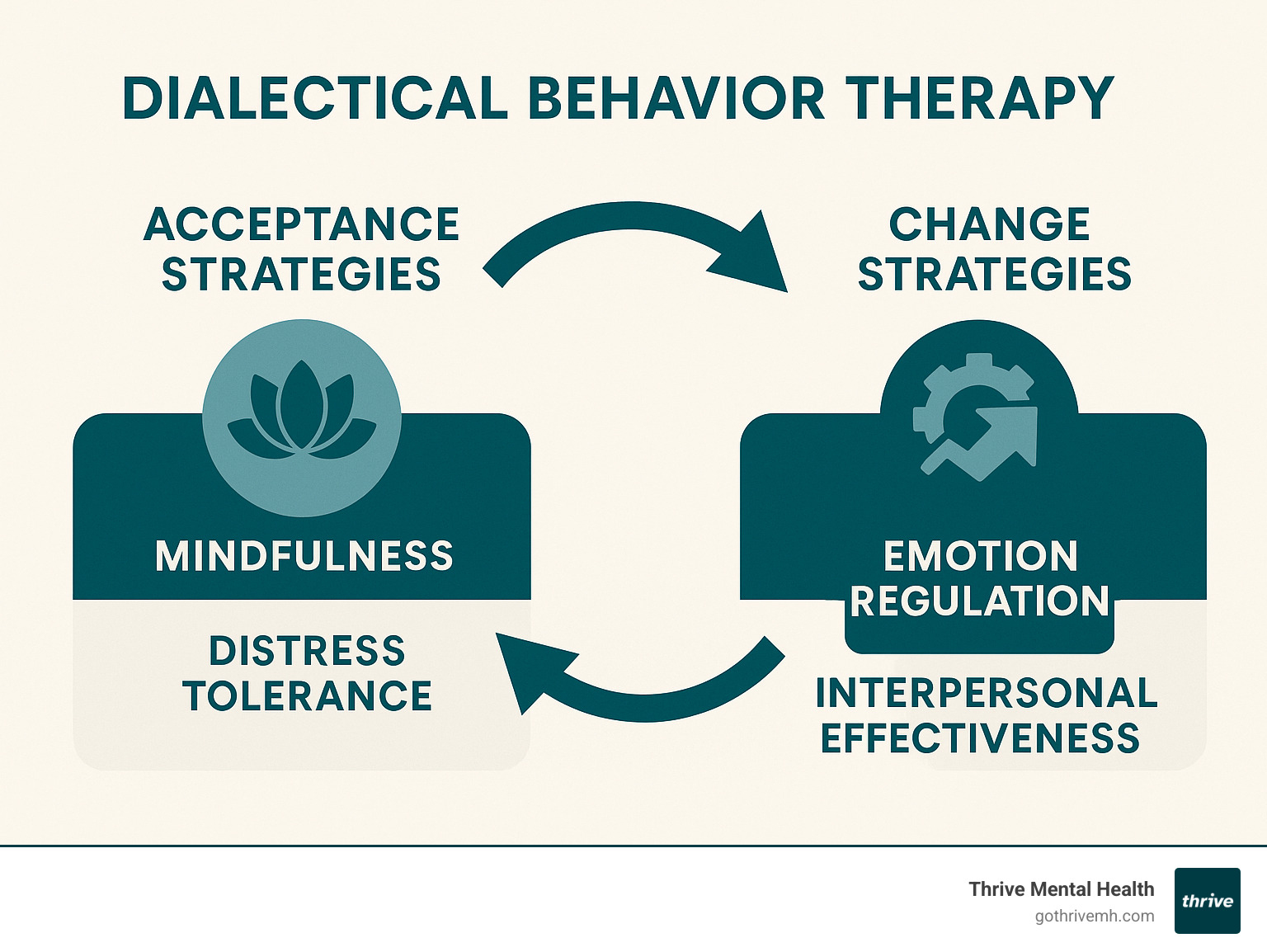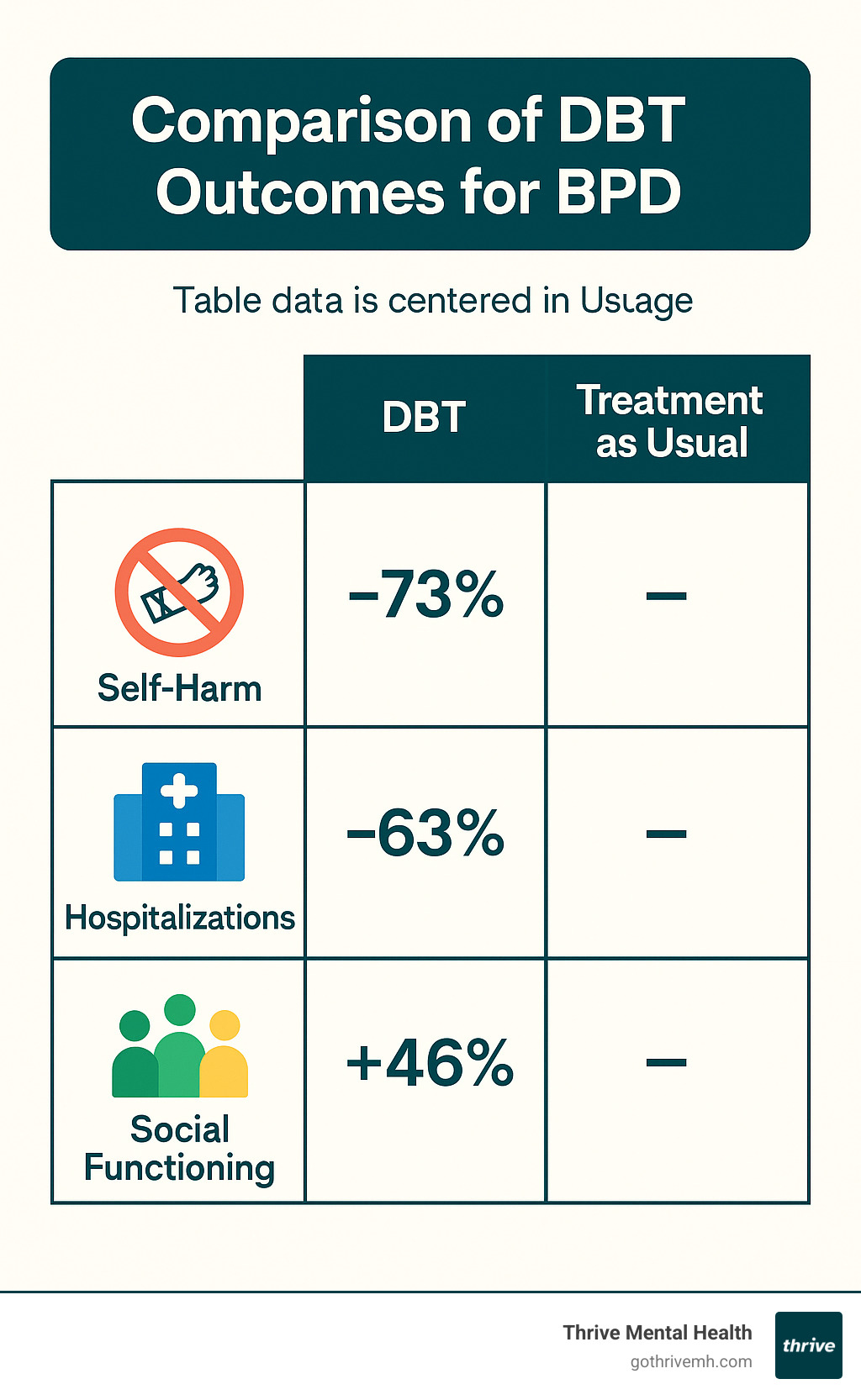The Definitive Guide to Dialectical Behavior Therapy (DBT)

What Is Dialectical Behavior Therapy?
Dialectical behavior therapy (DBT) is an evidence-based treatment that combines acceptance and change strategies to help people manage intense emotions and build healthier relationships. Developed by psychologist Marsha Linehan, DBT teaches four core skills: mindfulness, distress tolerance, emotion regulation, and interpersonal effectiveness.
Quick Answer for “Dialectical Behavior Therapy”:
- What it is: A type of cognitive-behavioral therapy focused on emotional regulation
- Who it helps: People with borderline personality disorder, depression, anxiety, PTSD, and eating disorders
- Core skills: Mindfulness, distress tolerance, emotion regulation, interpersonal effectiveness
- How it works: Individual therapy + group skills training + phone coaching
- Evidence: Proven to reduce self-harm, suicide attempts, and hospitalizations
DBT was created for individuals with high “emotional sensitivity.” The term “dialectical” refers to its core principle: balancing the opposites of accepting yourself as you are while working to change unhelpful behaviors. What makes DBT unique is its focus on validation. It acknowledges that your emotions are valid given your experiences, which helps you feel understood as you learn new coping skills.
The treatment combines cognitive-behavioral therapy with mindfulness practices from Zen Buddhism. Research shows DBT can reduce suicide attempts by up to 50% and significantly decrease hospitalizations for people with borderline personality disorder.
At Thrive Mental Health, we’ve seen how dialectical behavior therapy principles transform lives for clients in our Florida programs. DBT’s emphasis on acceptance and change creates lasting improvements for those struggling with emotional dysregulation.
Dr. Marsha Linehan developed DBT while treating chronically suicidal individuals with Borderline Personality Disorder (BPD). When she found that change-focused interventions led to patients dropping out, she integrated radical acceptance, creating DBT’s unique balance. Dr. Linehan later revealed her own struggles with BPD, highlighting her deep commitment to this therapy. You can read more in this New York Times article: Expert on Mental Illness Reveals Her Own Struggle.
DBT is based on the biosocial theory, which posits that emotional dysregulation stems from a combination of biological emotional vulnerability and an invalidating environment. When a person with high emotional sensitivity is raised in an environment that dismisses their feelings, they struggle to manage their emotions. DBT addresses this by teaching skills within a validating therapeutic setting.
The “dialectical” aspect is the philosophical core of DBT, involving the synthesis of two opposites. The primary dialectic is helping individuals accept themselves exactly as they are and commit to making significant life changes. It’s about holding both truths simultaneously to find a more effective path forward, as illustrated below:

Who Can Benefit From DBT?
Originally for Borderline Personality Disorder (BPD) and chronic self-harm, dialectical behavior therapy is now adapted for a broad range of conditions. Its principles help many individuals build a “life worth living.” So, who can benefit from DBT?
Dialectical behavior therapy is particularly effective for:
- Borderline Personality Disorder (BPD): As the condition DBT was created for, it is highly effective at reducing symptoms like impulsivity, mood swings, and relationship instability. Many individuals no longer meet the diagnostic criteria after comprehensive treatment.
- Chronic Suicidal Ideation and Self-Harm Behaviors: DBT provides practical skills to manage overwhelming emotional pain without resorting to dangerous behaviors, offering healthier ways to cope with intense feelings.
- Post-Traumatic Stress Disorder (PTSD): For complex PTSD, DBT helps manage intense emotions and detachment. It builds a strong foundation of coping skills to support trauma processing.
- Substance Use Disorders: Since substance use is often a way to cope with difficult emotions, DBT is effective in reducing use, managing cravings, and improving treatment adherence by teaching new emotional coping strategies.
- Eating Disorders: For conditions like bulimia and binge-eating disorder, DBT addresses the underlying emotional dysregulation and impulsivity, helping build a healthier relationship with food and body.
- Treatment-Resistant Depression: When depression hasn’t responded to other treatments, DBT offers new strategies for managing mood and improving daily life, especially when emotional intensity is a factor.
- Anxiety Disorders: DBT’s focus on mindfulness and distress tolerance provides valuable skills for managing intense anxiety, panic attacks, and phobias.
Research consistently shows how widely effective dialectical behavior therapy is, as detailed in this scientific review: Scientific research on DBT indications.
In Florida, from Tampa Bay to Central Florida, our DBT programs provide the support and skills needed to manage these challenges and build a life worth living.
The Four Core Skill Modules of DBT
Dialectical behavior therapy teaches four powerful skill modules, which act as a toolkit for navigating life’s challenges. These skills are typically taught in a supportive group setting, creating a collaborative learning environment.

Mindfulness: The Foundation of DBT
Mindfulness is the foundation of DBT, teaching you to be fully present and observe your thoughts and feelings without judgment. This helps you respond to situations more thoughtfully. A core concept is the “Wise Mind,” the balance between your emotional and rational sides that guides wise decisions. Mindfulness is practiced using:
- “What” Skills: Observe experiences without changing them, Describe them factually, and Participate fully in the moment.
- “How” Skills: Practice being Non-judgmental, focusing One-mindfully on one thing at a time, and acting Effectively to achieve your goals.
These skills build present-moment awareness, which is crucial for managing emotions.
Distress Tolerance: Surviving a Crisis
Distress Tolerance skills are an emergency toolkit for surviving crisis moments without resorting to impulsive or destructive actions. Key techniques include:
- TIPP Skills: Use your body’s physiology to calm down quickly. Change your Temperature with cold water, use Intense exercise, practice Paced breathing, and try Paired muscle relaxation.
- Radical Acceptance: This means acknowledging reality as it is, without fighting it. Accepting a painful situation, rather than approving of it, reduces suffering.
- Self-Soothing: Comfort yourself using your five senses—sight, sound, smell, taste, and touch—to find calm in a difficult moment.
These skills help you “ride the wave” of intense emotions until they pass.
Emotion Regulation: Taking Control of Your Feelings
Emotion Regulation skills help you take control of your feelings. The goal is not to eliminate emotions, but to understand them, reduce their intensity, and change unhelpful emotional responses. This involves:
- Understanding and Naming Emotions: Identify what you’re feeling and what it’s telling you.
- Checking the Facts: Determine if your emotional reaction fits the situation.
- Opposite Action: If an emotion is unjustified or unhelpful, act opposite to its urge (e.g., approach instead of avoid).
- Problem-Solving: If an emotion is justified, address the problem that’s causing it.
- Reducing Vulnerability: Proactively care for yourself by managing sleep, nutrition, exercise, and health (using the PLEASE skills) to build a stable emotional foundation.
By mastering these skills, you can steer your emotional world with greater ease.
Interpersonal Effectiveness: Building Healthy Relationships
Interpersonal Effectiveness skills help you build healthy relationships, get your needs met, and resolve conflicts while maintaining self-respect. DBT uses memorable acronyms for these skills:
- DEAR MAN: A technique for asking for something or saying no. Describe, Express, Assert, Reinforce, stay Mindful, Appear confident, and Negotiate.
- GIVE: A skill for maintaining relationships. Be Gentle, act Interested, Validate, and use an Easy manner.
- FAST: A skill for keeping your self-respect. Be Fair, make no unnecessary Apologies, Stick to your values, and be Truthful.
These skills provide a clear framework for navigating social interactions effectively.
How a Comprehensive Dialectical Behavior Therapy Program Works
Dialectical behavior therapy is a comprehensive treatment model, not just a single type of therapy. It functions as a complete support system with several interconnected components that create a nurturing environment for healing.

The Four Components of Standard DBT
A comprehensive dialectical behavior therapy program includes four essential components that work together to help you build a “life worth living.”
- Individual Psychotherapy: Weekly one-on-one sessions focused on applying DBT skills to your life, managing problem behaviors, and staying motivated.
- Weekly Skills Group: Group sessions that function like a class to teach the four core DBT modules: Mindfulness, Distress Tolerance, Emotion Regulation, and Interpersonal Effectiveness.
- In-the-Moment Phone Coaching: Brief calls to your therapist between sessions for guidance on using skills in real-time situations. This is not a crisis line but a tool for immediate skills application.
- Therapist Consultation Team: A team meeting for DBT therapists to support each other, ensure adherence to the model, and prevent burnout, which leads to better client care.
These integrated components create a robust structure for learning and practicing healthier behaviors.
The Client-Therapist Partnership in Dialectical Behavior Therapy
The client-therapist relationship in dialectical behavior therapy is a collaborative partnership built on respect. Your therapist acts as a coach, balancing acceptance with change. A key strategy is validation, where the therapist acknowledges that your feelings make sense given your experiences, helping you feel understood. Practical tools are central to this partnership:
- Diary Cards: You’ll use these to track moods, target behaviors, and skill use. Diary cards guide individual sessions and help identify patterns. See an example here: Example of a DBT diary card.
- Behavioral Chain Analysis: When a problem behavior occurs, you and your therapist will analyze the chain of events leading up to it to understand triggers and find points for intervention.
This partnership and these tools empower you to take an active role in your recovery.
The Role of Medication in DBT Treatment
Medication is not a core component of dialectical behavior therapy, which focuses on skills-based behavioral change. However, it can be a helpful adjunct, especially for co-occurring conditions like depression or anxiety. Medication can stabilize symptoms, making it easier to engage in therapy. When medication is used, the DBT therapist collaborates with the prescribing doctor to ensure it aligns with therapy goals. The primary aim is to support your ability to participate fully in treatment. For conditions like BPD, therapy remains the primary treatment. In fact, studies show that Dialectical Behavior Therapy can significantly reduce the need for medications and other medical services, highlighting its power in creating lasting change. At Thrive Mental Health, we provide comprehensive DBT programs in Florida to help individuals achieve this lasting change.
Is DBT an Effective Treatment?
Dialectical behavior therapy is one of the most well-researched and effective treatments available, particularly for the complex conditions it was designed to address. As an evidence-based treatment endorsed by organizations like the American Psychiatric Association, its proven outcomes are significant.
DBT consistently leads to:
- Reduced suicidal behavior and self-harm
- Fewer hospitalizations
- Lower treatment dropout rates compared to other therapies
- Improved anger management and better social functioning
The following graphic illustrates the powerful impact of DBT compared to standard treatments:

While developed for BPD, DBT is also highly effective for other challenges. It helps individuals with substance use disorders stay sober and assists those with eating disorders in reducing behaviors like binge eating. It also offers new hope for treatment-resistant depression.
The results are backed by data:
- One study found 77% of participants with BPD no longer met the diagnostic criteria after one year of DBT.
- Another study showed 89% of women with binge-eating disorder stopped bingeing after DBT.
These powerful outcomes are why Thrive Mental Health is committed to offering dialectical behavior therapy in our Florida programs. We’ve seen these approaches transform lives. If you’re in Florida, we invite you to learn more about our DBT-informed programs in Florida.
How to Find DBT in Florida and Get Started
Finding the right dialectical behavior therapy program can feel daunting, but an expert-led program that adheres to the proven model is life-changing. At Thrive Mental Health, we are dedicated to making this transformative care accessible across Florida, from Tampa Bay and St. Petersburg to Central Florida.
What to Look For in a DBT Provider
Not all programs that offer dialectical behavior therapy are the same. To ensure effectiveness, look for a provider that adheres to the complete model. Key things to look for include:
- Comprehensive Treatment: The program must include all four components: individual therapy, skills group, phone coaching, and a therapist consultation team.
- DBT-LBC Certification: While not required, certification from the DBT-Linehan Board of Certification indicates rigorous training and adherence to the model.
- Weekly Individual and Group Sessions: These are essential and should be offered concurrently.
- Experience with Your Concerns: Ensure the provider has a track record of treating your specific challenges, whether it’s BPD, eating disorders, or PTSD.
Ask questions about their training and experience to feel confident in your choice.
Flexible Treatment Options: IOP and PHP
At Thrive Mental Health, we understand that traditional residential programs aren’t always the right fit. We offer flexible, structured programs that deliver all the components of dialectical behavior therapy.
- Intensive Outpatient Programs (IOP): A step-up from standard outpatient therapy or a step-down from inpatient care, IOP provides several days of structured therapy per week while you live at home.
- Partial Hospitalization Programs (PHP): For those needing a higher level of care without an overnight stay, PHP offers intensive daily programming.
Both our IOP and PHP models effectively integrate DBT skills. To ensure accessibility, we offer virtual care across Florida and in-person programs in Tampa Bay, St. Petersburg, and Central Florida, allowing you to find the right level of support for your life.
How to Get Started with Dialectical Behavior Therapy
Taking the first step is brave, and we’re here to guide you. Your journey with Thrive Mental Health begins with a thorough initial assessment for our team to understand your unique needs and determine if a dialectical behavior therapy approach is the right fit. Next, we create a personalized treatment plan—a roadmap for your recovery that outlines your goals and the DBT components you’ll engage with. You will receive expert-led care from clinicians highly trained in DBT within a compassionate, validating environment. Our passion is helping you build a life worth living. If you’re in Florida and ready to see how DBT can create profound change, we invite you to connect with us.